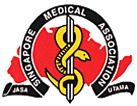
THESMANEWS
Present Issue
Past Issues
Journals
Present Issue
Past
Issues
Letters to the Editor

CARE FOR THE ELDERLY
The Ministry of Health has formed in May this year, a new division of healthcare called “the Division of Elderly Services”. It is headed by Dr Ling Sing Lin. With the anticipated increase in the number of elderly people in the years ahead, this is timely. Today we have 6.9% of the population who are 65 years and older. This figure will increase to 18.4% in 2030. In absolute numbers, the increase will be from 20,9700 today to 798,600 in 2030.
The majority of the elderly, that is 93% will be healthy. The strategy
in caring for these elderly is to encourage them, through mass health education
as well as individual counselling, to adopt preventive and health promotive
measures and to see a doctor when they have acute medical problems. Disease
prevention and health promotion is just as important to this group of people
as in the younger people.
Attention to diet, exercise and a temperate lifestyle help to maintain good health status. Specific measures to prevent falls are particularly important in the old-old, namely 75 years and older. Old people have decreased functional reserve and therefore are less able to cope with acute medical problems. The latter must be aggressively managed to prevent a vicious cycle of complications. This is an important concept that the old people themselves, their carers and attending doctors must pay attention too. It has been said that the name of the child is TODAY, meaning that their health needs cannot wait. The same can be said for the old.
There is a small percentage of the elderly who will have varying degrees of poor health status and frailty. This group of the elderly will increase in numbers with advancing age. They require varying degrees of assistance on their activities of daily living. Many may be home bound. A multi-disciplinary approach is the best way to serve their medical and social needs.
The home care assistant is an important emerging member in the multi-disciplinary team. They will complement the nursing staff in the Home Nursing Foundation. Doctors too, need to be encouraged to join this team. Family members need to be involved too. The multi-disciplinary team also includes the hospital team members: geriatricians, organ specialists, physiotherapists and nursing staff.
Caring for the elderly at home is another paradigm shift in the work of the primary care doctor and the specialist in the coming years. There is a need for a seamless system for the elderly to move from home care to hospital care and back again to the home or nursing home.
The philosophy in delivering elderly services should be appropriate and cost effective care by all sectors of the health care delivery system. It is only when we have such a shared vision could we hope to contain the cost for caring for the elderly. Collectively, we must help the elderly stretch the health dollar and make the best use of their financial resources: their own savings and the contributions of family and friends for the majority may not add up to be very much.